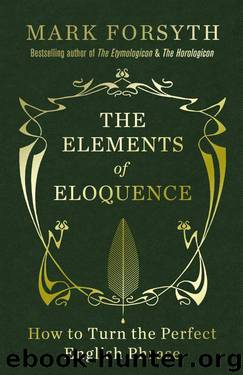The Elements of Eloquence: How to Turn the Perfect English Phrase by Forsyth Mark

Author:Forsyth, Mark [Forsyth, Mark]
Language: eng
Format: azw3, mobi, epub
Tags: etymology, grammar, rhetoric, english language
Publisher: Icon Books
Published: 2013-11-07T00:00:00+00:00
2 ‘Head Over Feet’ (1996) by Alanis Morissette and Glen Ballard.
Chapter 19
Isocolon
Roses are red.
Violets are blue.
That, at its simplest, is isocolon. Two clauses that are grammatically parallel, two sentences that are structurally the same. The Ancient Greeks were rather obsessed with isocolon, the modern world has rather forgotten it. The Greeks loved the sense of balance that it gave to writing, which reflected the sense of balance that they admired in thought. With isocolon one seems reasonable; without isocolon one seems hasty. With isocolon language acquired a calm rhythm, without isocolon prose became a formless heap. On the one hand the figure could describe antithesis with its graceful contrasts, on the other hand the trick could show emphasis through its gentle repetitions. O for the classical balance! Woe to the modern mess!
Because though isocolon can still be used in the calm Greek manner, it usually isn’t. When Cassius Clay said ‘Float like a butterfly, sting like a bee’, he had no calm and peaceful thoughts in his mind. And when Rick tells Ilsa, ‘Where I’m going, you can’t follow. What I’ve got to do, you can’t be any part of’, he doesn’t sound like Socrates contemplating virtue, he sounds like a man in a crisis with a gun and a girl at an airport.
Modern isocolons tend to work as a kind of spot-the-difference game. We use the similarities to point up the differences, and use the differences to point up the similarities. Rick’s lines contrast where with what, going with doing, following with taking part. So the sentences are differentiated: the first is about geographical movement, the second is about physical action. But at the same time the sentences simply restate each other. The ‘I’ and the ‘you can’t’ remain in their places, and Rick and Ilsa part at the airport.
Similarity and difference, comparison and contrast, are the stock in trade of isocolon, and that’s how Shakespeare liked to use it. When Brutus is explaining why he killed Julius Caesar, he gives this reply:
As Caesar loved me, I weep for him; as he was fortunate, I rejoice at it; as he was valiant, I honour him: but, as he was ambitious, I slew him. There is tears for his love; joy for his fortune; honour for his valour; and death for his ambition.
This is obviously a much more extended case of isocolon. You don’t have to stop at two parallels, you can go on for a very long time, so long as your lungs are big enough. John F. Kennedy in his inauguration address announced:
Let every nation know, whether it wishes us well or ill, that we shall pay any price, bear any burden, meet any hardship, support any friend, oppose any foe, to assure the survival and the success of liberty.
And Winston Churchill beat that with the slightly ridiculous:
Fill the armies, rule the air, pour out the munitions, strangle the U-boats, sweep the mines, plough the land, build the ships, guard the streets, succour the wounded, uplift the downcast, and honour the brave.
Download
The Elements of Eloquence: How to Turn the Perfect English Phrase by Forsyth Mark.mobi
The Elements of Eloquence: How to Turn the Perfect English Phrase by Forsyth Mark.epub
This site does not store any files on its server. We only index and link to content provided by other sites. Please contact the content providers to delete copyright contents if any and email us, we'll remove relevant links or contents immediately.
Cecilia; Or, Memoirs of an Heiress — Volume 1 by Fanny Burney(32548)
Cecilia; Or, Memoirs of an Heiress — Volume 2 by Fanny Burney(31947)
Cecilia; Or, Memoirs of an Heiress — Volume 3 by Fanny Burney(31932)
The Lost Art of Listening by Michael P. Nichols(7494)
Asking the Right Questions: A Guide to Critical Thinking by M. Neil Browne & Stuart M. Keeley(5762)
We Need to Talk by Celeste Headlee(5608)
On Writing A Memoir of the Craft by Stephen King(4936)
Dialogue by Robert McKee(4389)
Pre-Suasion: A Revolutionary Way to Influence and Persuade by Robert Cialdini(4224)
I Have Something to Say: Mastering the Art of Public Speaking in an Age of Disconnection by John Bowe(3878)
Elements of Style 2017 by Richard De A'Morelli(3343)
The Book of Human Emotions by Tiffany Watt Smith(3303)
Fluent Forever: How to Learn Any Language Fast and Never Forget It by Gabriel Wyner(3079)
Name Book, The: Over 10,000 Names--Their Meanings, Origins, and Spiritual Significance by Astoria Dorothy(2982)
Good Humor, Bad Taste: A Sociology of the Joke by Kuipers Giselinde(2945)
Why I Write by George Orwell(2945)
The Art Of Deception by Kevin Mitnick(2796)
The Grammaring Guide to English Grammar with Exercises by Péter Simon(2740)
Ancient Worlds by Michael Scott(2682)
